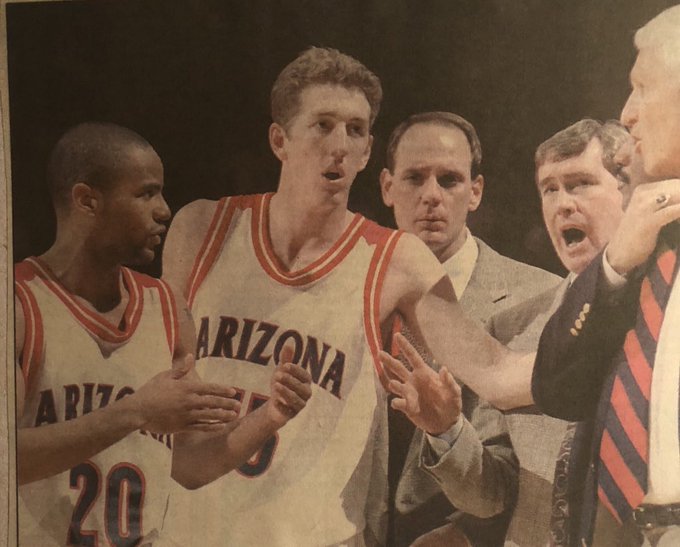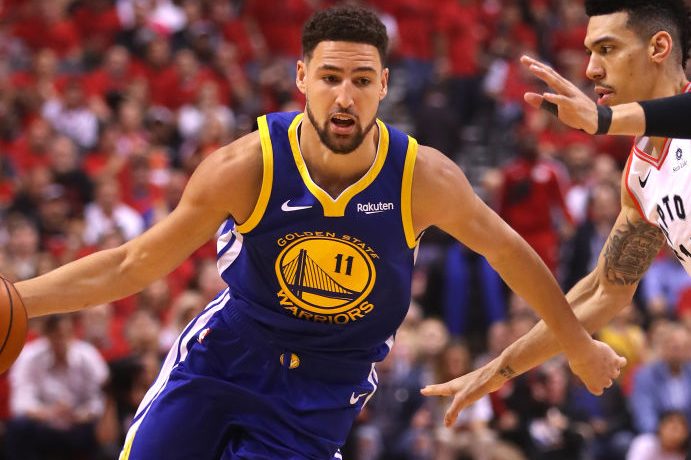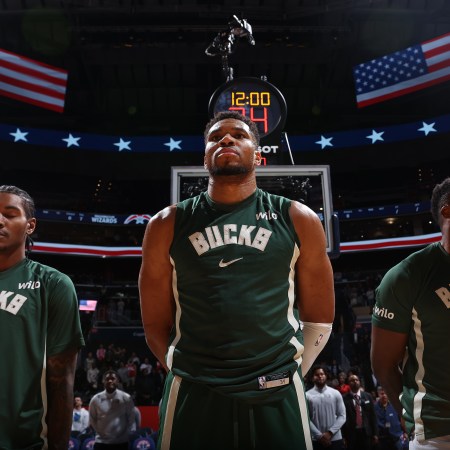As Chris Rock detailed in 2004 in his Uncensored special, though the terms “rich” and “wealthy” are similar, they are by no means interchangeable.
“Here’s the difference,” says Rock. “Shaq is rich. The white man that signs his check is wealthy.”
It’s been almost 15 years since that special aired and, at least in relative terms, there’s still a massive gap between the amount of money NBA players have and the amount of money owners do. But thanks to Joe McLean, that divide is getting smaller by the year.
A four-year NCAA basketball player for the Arizona Wildcats, McLean tried to make it in the NBA, but instead went on to play pro ball overseas for a Spanish team. After that, he went back to grad school after 3.5 years of chasing his dream of playing pro ball, eventually winding up in wealth management.
After 14 years of learning how successful business owners manage their money while thinking about their legacies, McLean, who had been contemplating a way to get back into sports, had an idea.
“A light went on for me,” McLean, 45, tells InsideHook. “I had a thought maybe I’d be a high-school basketball coach, but now this was a chance to be a financial coach and be back in sports. And from the point the light went on, I decided to take almost a year and understand every aspect of every sport — whether it was football, basketball or baseball — and learn how they got paid and what some of the issues were.”

Over the next year, McLean tried to find out the answers to some questions he had: What did athletes think about when they got their first check? What was the first thing they did with the check? Who are the good people in the business and who are other individuals trying to take advantage of them? What’s the step-by-step process that has to be in place in sports for a rookie all the way through retirement?
“Inside those 12 months, I realized what some of the bigger issues were and built a plan,” McLean says. “No different than drawing up a play.”
That was seven years ago, and McLean’s California-based company, Intersect Capital, now manages contracts worth nearly $2 billion for about 50 athletes across the NFL, MLB, PGA and NBA, including Whitney Mercilus, Nolan Arenado, Sergio Garcia and Klay Thompson, according to The New York Times, who profiled the NBA’s de facto “money whisperer” last month. This summer Thompson, 29, signed a max contract worth $190 million that will keep him with the Golden State Warriors for the next five years.
“The point I try to make is to compete on the court, not in the locker room. Don’t worry about what everybody else is trying to do with their money. Just focus on what you’re trying to do.” – Joe McLean
When one of his clients signs a massive deal like this one, McLean has a process for helping them plan out what comes next.
“The first step is to lay out the actual contract,” he says. “So, for this contract in particular, we know it’s five years. We know it’s guaranteed. We know the pay cycles, when it comes in. It’s coming in every two weeks. So what’s the difference between gross and net? How much money does that represent? Klay is an 85-percent-plus saver of every net dollar, so we talk about how do we ramp that up even higher. Then we look at where are we today versus where we were and discuss some of the milestones personally that he wants to accomplish with his money. He’s really smart, particularly around these types of things.”
McLean, who won’t work with a player unless they agree to set aside at least 60 percent of every dollar they make, has Thompson’s money divided into three buckets — the figurative variety.
The first is the safety and security bucket. “That safety and security bucket is everything we can truly control,” McLean says. “It’s all about what the fixed costs are going to be for the next five years and then for the rest of life. You have to be able to live off of that and sustain your lifestyle. The safety and security bucket is making sure, okay, whatever home or properties we buy, by the end of the contract, there’s no debt. We pay everything off.”
Once the safety and security bucket is filled, the growth bucket comes next.

“The growth bucket is all very conservative, income-producing-type vehicles that help a person compound their interest slowly over time,” McLean says. “That’s great for someone in their 20s for understanding the value of compounding interest. The sooner you start, the more powerful it becomes on the back end. It’s not the first time your money doubles — it’s the third and fourth time. For someone who started in their 20s, when they’re 50 or 60 years old, the compounding wealth effect is incredible. That bucket’s got to be continually filled even if you filled it in past contracts.”
Which brings us to bucket No. 3. “If you’ve done the safety and security bucket and filled the growth bucket, then you reserve the right to what I call the dream or entrepreneurial bucket. Ten percent leftover, max, goes into that bucket,” McLean says. “It’s where we start exploring what other interests someone has? Is it investments? Is it a venture or private equity? It could be the second home you shouldn’t buy, but you can. Maybe a really nice extra car. Lifestyle things or business opportunities that are all-liquid, and high-risk, but may give the person the ability to explore something outside of the sport they play in.”
It’s that third bucket McLean’s clients always want to fill first — and that has the potential to be a problem if it goes unchecked.
“Whether you look at athletes or entrepreneurs, a lot of them are willing to take an enormous amount of risk in their career because they’re willing to bet on themselves,” McLean says. “That same characteristic can be detrimental to how you invest. If you take the same types of risks with your money that made you a success, that could also be how you could lose it all. So it’s taking some of the personality traits that make you great, helping you become aware of it and show you how that can also cause you to make some mistakes financially because you’re always willing to bet on yourself.”
“A lot of the things that go on in a professional athlete’s life are universal to everyone else. It’s just there are more zeros and commas.” – Joe McLean
That’s why the first two buckets have to be filled before the dream bucket can become a reality for McLean’s clients. “For individuals who have already come into some level of success, you’ve got to dial it back and put the fundamentals in place,” he says. “Let’s make sure we stay consistent and conservative with those first two buckets so even if you go out and add more risk to your life from an investment perspective in the dream bucket, even if it goes to zero, we’re still good because you’ve done all the other basic fundamentals.”
Besides filling the first two buckets before focusing on the third, McLean has identified a number of other things his clients do to help themselves hang onto their money.
Among them:
Compete on the court and not in the locker room
“I always say that awareness is a key to understanding how much money is going in and out of your life. But it also could be detrimental when you start looking over the fence to your neighbor as to what they have in their house and how they live. The point I try to make is to compete on the court, not in the locker room. Don’t worry about what everybody else is trying to do with their money. Just focus on what you’re trying to do.”
Buy the right watch, not the bright watch
“It’s okay to go out and buy a really nice car, but just buy one of them. It’s okay to buy a really nice house, but buy a house where you want to live, not necessarily where you play, because you’ve got to be sensible. The house you want in Milwaukee may not be a house that someone else could afford someday when you stop playing there. If you’re going to live there for a much longer period of time, then it’s okay to invest in that house and make it a longer-term investment.”
Pay attention
“The laws of finance are different than the laws of physical balance. If you’re trying to walk over a log and you take your eye off the log, you’re going to fall in the water. If you’re earning money and you’re swiping your card, there are no immediate consequences if you take your eye off your money. So you could live seasons of your life without really realizing the consequences of what you’re doing in real-time.”
Learn to say “No”
“I always remind clients that the first meeting in any pitch is the best meeting. It’s always going to sound great. And if you’re not willing to take the second meeting and the third meeting and really dig under and see what’s going on, then it’s not worth it. And so that’s been a simple rule of thumb. When they get pitched, they can say ‘maybe’ so that either I can say ‘no’ or they can put that [potential business partner] through a situation where it’s a professional meeting to help answer three or four questions. And if they don’t answer those three or four questions the right way, then we continue to move forward.”
And pro athletes aren’t the only ones who can benefit from the three-bucket strategy or employing some of the tactics noted above.
“A lot of the things that go on in a professional athlete’s life are universal to everyone else,” McLean says. “It’s just there are more zeros and commas. Everyone has to manage their money as it comes in and build plans.”
Though none of McLean’s clients have built a plan that closes the wealth gap between themselves and the owners they play for yet, that day is coming faster than Thompson’s quicksilver release. As McLean notes, ownership of a professional sports team is a topic he discusses with his clients all the time.
The Charge will help you move better, think clearer and stay in the game longer. Subscribe to our wellness newsletter today.



















